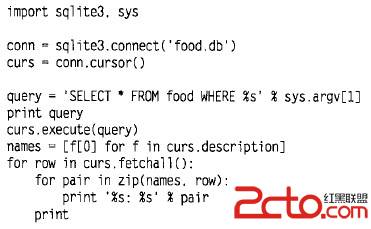python判断对象是否为文件对象(file object)
方法1:比较type
第一种方法,就是判断对象的type是否为file,但该方法对于从file继承而来的子类不适用:
[python]
>>> f = open(r"D:\2.zip")
>>> type(f)
<type 'file'>
>>> type(f) == file
True
>>> class MyFile(file):
pass
>>> mf = MyFile(r"D:\2.txt")
>>> type(mf)
<class '__main__.MyFile'>
>>> type(mf) == file
False
方法2:isinstance
要判断一个对象是否为文件对象(file object),可以直接用isinstance()判断。
如下代码中,open得到的对象f类型为file,当然是file的实例,而filename类型为str,自然不是file的实例
[python]
>>> isinstance(f, file)
True
>>> isinstance(mf, file)
True
>>> filename = r"D:\2.zip"
>>> type(filename)
<type 'str'>
>>> isinstance(filename, file)
False
方法3:duck like(像鸭子一样)
在python中,类型并没有那么重要,重要的是”接口“。如果它走路像鸭子,叫声也像鸭子,我们就认为它是鸭子(起码在走路和叫声这样的行为上)。
按照这个思路我们就有了第3中判断方法:判断一个对象是否具有可调用的read,write,close方法(属性)。
[python]
def isfilelike(f):
"""
Check if object 'f' is readable file-like
that it has callable attributes 'read' , 'write' and 'closer'
"""
try:
if isinstance(getattr(f, "read"), collections.Callable) \
and isinstance(getattr(f, "write"), collections.Callable) \
and isinstance(getattr(f, "close"), collections.Callable):
return True
except AttributeError:
pass
return False
其他:读/写方式打开的”类文件“对象
只从文件读入数据的时候只要检查对象是否具有read,close;相应的只往文件中写入数据的时候仅需要检查对象是否具有write,close方法。就像如果仅从走路方式判断它是否为鸭子,只检查是否”走路像鸭子“;如果仅从声音来判断,则仅需要检查是否”叫声像鸭子“。
[python]
def isfilelike_r(f):
"""
Check if object 'f' is readable file-like
that it has callable attributes 'read' and 'close'
"""
try:
if isinstance(getattr(f, "read"), collections.Callable) \
and isinstance(getattr(f, "close"), collections.Callable):
return True
except AttributeError:
pass
return False
def isfilelike_w(f):
"""
Check if object 'f' is readable file-like
that it has callable attributes 'write' and 'close'
"""
try:
if isinstance(getattr(f, "write"), collections.Callable) \
and isinstance(getattr(f, "close"), collections.Callable):
return True
except AttributeError:
pass
return False
另:为什么用getattr而不是hasattr www.zzzyk.com
这里为什么不用hasattr,而是用getattr来承担抛出AttributeError的风险呢?
一方面,hasattr就是直接调用getattr来看是否抛出了AttributeError,如果没有抛出就返回True,否则返回False,参看这里。既然如此,我们就可以自己来完成这个工作。
另一方面,这样我们可以得到属性对象,然后可以用isinstance判断是否为collections.Callable的实例。两者结合,如果有该属性,并可以被调用,则返回True。
作者:GhostFromHeaven
补充:Web开发 , Python ,




